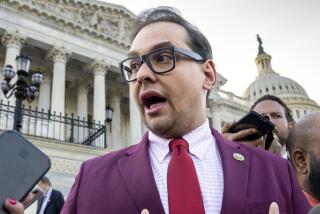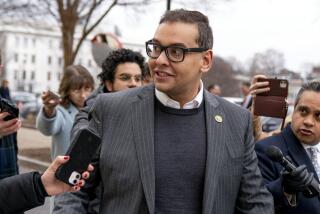Health Reform Tied to Fate of Rostenkowski
- Share via
WASHINGTON — As a junior member of the House Ways and Means Committee in 1976, Rep. Dan Rostenkowski demonstrated a political style honed in the rough-and-tumble of his native Chicago.
Sen. Abraham Ribicoff, a fellow Democrat, had proposed tax breaks for insurance companies in his home state of Connecticut. But eight years earlier, Ribicoff had criticized Chicago Mayor Richard J. Daley for “Gestapo tactics” in handling anti-war demonstrators during the 1968 Democratic Convention.
Rostenkowski avenged his patron. After mustering the votes and defeating Ribicoff’s tax breaks in the committee, he boasted to a reporter: “I went in the room and just kicked the brains out of them.”
Long ago, the barrel-chested Rostenkowski shed that ward heeler image. Now, as chairman of the Ways and Means Committee, he is regarded as one of the most powerful and shrewd members of Congress.
But the aura of machine politics--of favors granted and prices extracted--still bedevils the Chicago Democrat as he fights a long-running federal investigation of his financial affairs.
The outcome not only will determine Rostenkowski’s future, it also will have a significant impact on the fate of health care reform in the United States.
The Clinton Administration is depending heavily on Rostenkowski to help shepherd the President’s planned overhaul of the health care system through Congress, just as he did for President Ronald Reagan with the landmark tax reform package of 1986.
“Without Rostenkowski, health care reform is dead,” worried one Administration official involved in crafting strategy, who spoke on the condition that he not be identified.
Not everyone agrees that Rostenkowski’s role is pivotal. But there is unanimity that his legislative skills and iron grip on Ways and Means would do much to smooth the rocky road confronting the health care proposal, which is expected to be unveiled in the next few weeks.
“He is a masterful tactician, and this is a Gargantuan legislative challenge,” said David Axelrod, a Chicago-based consultant to the Democratic National Committee and former campaign adviser to Rostenkowski.
Those close to Rostenkowski are divided on the toll that the federal investigation is taking on the congressman and his effectiveness. A senior aide said that he retains control of the committee and remains focused on supporting Clinton’s economic and health agendas.
But a close associate said that Rostenkowski is distracted by the inquiry, which has inundated his office with subpoenas and caused a spate of news articles in the national press and Chicago newspapers.
“It is having a pernicious effect on his attention level,” complained the associate, who spoke on condition that he not be identified.
The investigation by the U.S. attorney’s office in Washington began two years ago as a simple case of alleged employee theft from the House Post Office. During the inquiry, investigators received information that led to scrutiny of the stamp-buying practices of Rostenkowski and two other Democratic congressmen.
Records show that Rostenkowski’s office used taxpayer funds to buy $29,672 worth of stamps from the House Post Office between 1986 and early 1992. The purchases were made despite the congressional franking privilege, which allows most official mail to be sent free.
The scheme allegedly was designed to generate cash by allowing staff members to exchange vouchers for stamps that could be sold or even directly exchanged for money, according to sources close to the inquiry. It was allegedly aided by obliging staff members in the post office. The longtime postmaster was a pal of the congressman. One of the supervisors was a patronage worker sponsored by Rostenkowski.
“I mail a lot,” Rostenkowski said a year ago. “Overseas mail, you’ve got to put stamps on.”
Rostenkowski refused to appear before a federal grand jury last July, citing the Fifth Amendment protection against self-incrimination. Prosecutors rejected his offer of an informal meeting. He declined through a spokesman to discuss the inquiry last week. But the spokesman repeated that the congressman has done nothing wrong.
By the end of 1992, Rostenkowski had used campaign funds to pay nearly $72,000 to lawyers for two staff members and $71,891 to his own lawyers, according to filings at the Federal Election Commission.
In a new development, sources involved in the inquiry said that prosecutors recently have granted immunity to some Rostenkowski and committee staff members to compel them to testify before the grand jury here.
One of those staff members, Virginia C. Fletcher, Rostenkowski’s administrative assistant, has appeared before the grand jury more than once, and witnesses are scheduled to testify over the next month and a half, according to two defense lawyers in the case and a congressional staff member. Fletcher’s lawyer, Robert Plotkin, refused to comment. Appearing before a grand jury or receiving immunity is not an indication of wrongdoing.
The investigation has increased in scope and complexity in recent weeks, expanding beyond stamp purchases to a more exhaustive examination of Rostenkowski’s finances. In compliance with House rules, the congressman disclosed on April 2 that he had received subpoenas for financial records from his office and the Ways and Means Committee, dating back to the late 1970s.
IRS agents have joined investigators from the U.S. Postal Service and FBI. A source close to the inquiry said that the IRS is reconstructing the flow of office and campaign expenses by Rostenkowski over the last several years, raising the possibility of tax violations.
Responding to reports in the Chicago Sun-Times earlier in the year, the grand jury also began looking into $73,000 in campaign funds that Rostenkowski paid as rent to himself and his sisters for a little-used office in his Chicago home. Also under scrutiny is $73,000 in taxpayer money used to lease three vehicles for the congressman.
Rostenkowski has said that both arrangements were proper and conducted within the regulations established by Congress for such expenses.
The congressman’s defenders maintain that this is nothing more than nickel-and-dime stuff, minor infractions even in the worst light. They portray Rostenkowski as the victim of an uncontrolled government fishing expedition with political overtones.
The political angle emerged full-scale last month. When Atty. Gen. Janet Reno asked for the resignations of all 93 U.S. attorneys put in office by Republican presidents, Jay B. Stephens, the U.S. attorney in Washington, blasted her for removing him at what he said was a critical point in the Rostenkowski investigation.
Reno responded a few days later with an unusual public comment on a pending investigation, saying that she had urged Stephens’ replacement to “investigate (Rostenkowski) as completely and thoroughly as possible.”
Defense attorneys involved in the case speculate that it will be difficult for the U.S. attorney’s office and Justice Department to walk away from such a high-profile, politically tinged investigation without indicting someone of stature.
“It’s going to be damn hard to stop the train, even if there’s garbage at the end of the line,” said a former federal prosecutor who represents a subject in the inquiry.
No decision is expected soon on whether to charge Rostenkowski. Under House rules, an indictment would force him to step down as committee chairman.
Congressional staff members and lobbyists said that Rostenkowski’s removal would throw the Ways and Means Committee into disarray, greatly diminishing chances of Clinton’s health care package passing intact.
A lobbyist, whose clients stand to lose considerably if health care reform passes, said the outcome rests heavily on Rostenkowski’s fate.
“If he goes down, so does health care reform,” said the lobbyist, who spoke on condition that his name not be used. “If he is not charged and remains strong, he can make it happen.”
Any tax increases needed to finance the reform package will be the domain of the Ways and Means Committee. Rostenkowski has vowed to support Clinton’s effort. Not long ago, he told Hillary Rodham Clinton that he is willing to bend in the wind “like a palm tree” to accommodate the program she is helping formulate.
Rostenkowski is renowned for his ability to keep the huge committee in line. In 1981, a committee member who led a successful fight against a Rostenkowski tax plan found himself relegated to the back of the bus on a committee trip to Baltimore. Rostenkowski also had the wheels removed from the congressman’s chair in the committee’s hearing room.
The chairman demonstrated his legislative acumen in 1986, when he played a central role in piloting Reagan’s far-reaching tax bill through Congress. It was a highlight of Rostenkowski’s career in Washington, and the Clinton White House likes to see it as a preview of what he will do for their health care legislation.
But White House officials are also aware of what happened to another health care proposal when another chairman of the Ways and Committee ran into trouble.
It was the fall of 1974. Congressional Democrats had struck a deal with President Richard Nixon to adopt wide-ranging health reforms. A key ally was Rep. Wilbur Mills (D-Ark.), chairman of Ways and Means. Then Mills was discovered drunk at 2 a.m. near the Tidal Basin in the company of a former strip-tease dancer who used the stage name of Fanne Foxe. Health care reform went nowhere that year--or since.
Times staff writers Ronald J. Ostrow and Dwight C. Morris in Washington and researcher Tracy Shryer in Chicago contributed to this story.
More to Read
Get the L.A. Times Politics newsletter
Deeply reported insights into legislation, politics and policy from Sacramento, Washington and beyond. In your inbox twice per week.
You may occasionally receive promotional content from the Los Angeles Times.










